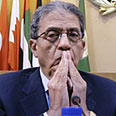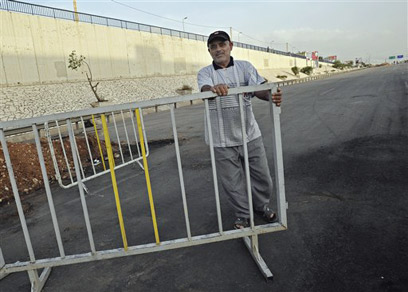
Arab League Secretary General Amr Moussa
צילום: AP
Mediators announce deal to end Lebanon violence
Arab League says warring parties in Lebanon agree to lay down weapons, Beirut airport reopens for business week after being closed. Hizbullah: We want to return to a settlement which leads, in the end, to there being neither victor nor vanquished
Arab League mediators announced a deal on Thursday to end Lebanon's worst internal fighting since the civil war, after the US-supported government backed down in its conflict with Hizbullah.
Qatari Prime Minister Sheikh Hamad bin Jassim bin Jabr al-Thani also summoned Lebanon's government and Hizbullah-led opposition to Qatar for talks to resolve a broader political showdown which has paralyzed the country for 18 months.
"We declare an agreement sponsored by the Arab League to deal with the Lebanese crisis," Sheikh Hamad said. "The parties pledge to refrain from returning to the use of weapons or violence to realize political gains."
The political talks in Qatar, which start on Friday, would continue "until agreement is reached," he said.

Hizbullah removing roadblocks in Beirut (Photo: AP)
As Sheikh Hamad announced the deal, live television pictures showed mechanical diggers on the airport road removing roadblocks erected by Hizbullah supporters last week as part of a protest campaign against the government.
"The opposition has decided to end the civil disobedience (campaign) and open all roads and routes to the seaport and airport," opposition member of parliament Ali Hassan Khalil told Reuters.
Less than an hour later an airliner from Lebanon's Middle East Airlines landed at the airport, the first commercial flight to the facility in a week.
Over 80 killed
At least 81 people were killed in the fighting, triggered by government decisions last week to ban the Iranian-backed Hizbullah's communications network and sack Beirut's airport security chief, who is close to Hizbullah.Hizbullah said those moves were a declaration of war and briefly seized control of Muslim areas of the capital, dealing a severe blow to Washington's allies in the ruling coalition.
On Wednesday, the cabinet of Prime Minister Fouad Siniora cancelled the two measures, meeting one of Hizbullah's demands and easing tensions in the Lebanese capital. Hizbullah said the government's climb-down was a "natural way out" of the crisis.
"We want to return to a settlement which leads, in the end, to there being neither victor nor vanquished," Sheikh Naim Kassem, Hizbullah's deputy leader, said after meeting the Arab League delegation.
Hizbullah had also demanded the ruling coalition agree to talks as a condition for ending its civil disobedience campaign.
The talks in Qatar will tackle how to share power in the cabinet and the details of a new parliamentary election law. The row has paralyzed much of government and left Lebanon with no president since November.
Sheikh Hamad said top leaders would attend the talks in Doha but political sources said Hizbullah chief Sayyed Hassan Nasrallah would not attend because of security concerns.
Hizbullah are set to be represented by a senior official, most likely the head of the group's parliamentary bloc, MP Mohammad Raad, the sources said.
Any deal would result in army commander General Michel Suleiman being elected president.
As well as highlighting US-Iranian tensions, Lebanon's rivalries are also regarded as part of a regional tussle for influence between Saudi Arabia, which supports the ruling coalition, and Syria, which backs the opposition.
The United States has blamed the instability on Iran, Syria and Hizbullah, a political movement with a guerrilla army. Iran blames the United States for the violence.










